 On January 1, 2020, the Government Think Tank released its Draft “Model Concession Agreement for Setting Up Medical Colleges under Public Private Partnership” guideline document. Under the guideline the think tank has suggested Public Private Partnership (PPP) model to link private medical colleges and district hospitals. On January 1, 2020, the Government Think Tank released its Draft “Model Concession Agreement for Setting Up Medical Colleges under Public Private Partnership” guideline document. Under the guideline the think tank has suggested Public Private Partnership (PPP) model to link private medical colleges and district hospitals. |
|
|
|
 Government of India misses its disinvestment target as the plan to sell Bharat Petroleum Corporation Limited (BPCL), Air India and Container Corporation of India has not been succeeded. Government of India misses its disinvestment target as the plan to sell Bharat Petroleum Corporation Limited (BPCL), Air India and Container Corporation of India has not been succeeded. |
|
|
 The prices of Darjeeling Tea that recently received GI tag has fell by 20% to 25% due to unchecked flow of Nepal Tea into the country. The prices of Darjeeling Tea that recently received GI tag has fell by 20% to 25% due to unchecked flow of Nepal Tea into the country. |
|
|
|
 The Andhra Pradesh Government announced that it will deliver sand at customers’ door steps. As a pilot project, the government is to begin the initiative on experimental basis. The Andhra Pradesh Government announced that it will deliver sand at customers’ door steps. As a pilot project, the government is to begin the initiative on experimental basis. |
|
|
|
 Assam Chief Minister has launched the torch relay of the Khelo India Youth Games in Guwahati, Assam. The 3rd edition of the tournament will be held in January 2020. Athletes from all over the country will be coming to Guwahati for the Khelo India Youth Games. The officials of the competition are preparing a total of eight venues for the tournament to make the Games one of the largest sporting spectacles of the country. Assam Chief Minister has launched the torch relay of the Khelo India Youth Games in Guwahati, Assam. The 3rd edition of the tournament will be held in January 2020. Athletes from all over the country will be coming to Guwahati for the Khelo India Youth Games. The officials of the competition are preparing a total of eight venues for the tournament to make the Games one of the largest sporting spectacles of the country. |
| Source: The Hindu |
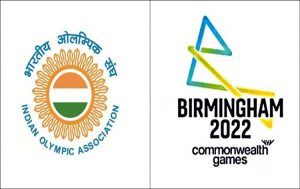 The Indian Olympic Association (IOA) has withdrawn its boycott call for the 2022 Commonwealth Games to be held in Birmingham. The decision was taken during its Annual General Meeting held in New Delhi. The cause of the boycott call was exclusion of shooting. IOA also announced that the country will bid to host either the 2026 or the 2030 edition. The Indian Olympic Association (IOA) has withdrawn its boycott call for the 2022 Commonwealth Games to be held in Birmingham. The decision was taken during its Annual General Meeting held in New Delhi. The cause of the boycott call was exclusion of shooting. IOA also announced that the country will bid to host either the 2026 or the 2030 edition. |
| Source: The Hindu |
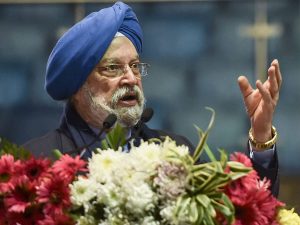 Minister of State (I/C) for Civil Aviation launched the Biometric enabled Centralised Access Control System (CACS) and ‘e-BCAS Project Training Module’. The two projects aims to enhance security and ease of doing business at airports. The CACS project is aimed to digitize the employee movement process at the airports. This multi-layered security system encompasses the uniqueness of the Airport Entry Permit (AEP) users, biometric authentication in addition to PIN-based identity verification through contactless smart card technology. The ‘e-BCAS’ project envisaged to achieve a “paperless office” under e-Governance initiative of Government of India. The ‘e-BCAS Project: Training Module’ aims to switch from manual process of training to digital platform. The objective of the e-BCAS project is to make all the activities in the BCAS transparent, user-friendly, and efficient. It also intends to provide an ease of doing business with the stakeholders. Minister of State (I/C) for Civil Aviation launched the Biometric enabled Centralised Access Control System (CACS) and ‘e-BCAS Project Training Module’. The two projects aims to enhance security and ease of doing business at airports. The CACS project is aimed to digitize the employee movement process at the airports. This multi-layered security system encompasses the uniqueness of the Airport Entry Permit (AEP) users, biometric authentication in addition to PIN-based identity verification through contactless smart card technology. The ‘e-BCAS’ project envisaged to achieve a “paperless office” under e-Governance initiative of Government of India. The ‘e-BCAS Project: Training Module’ aims to switch from manual process of training to digital platform. The objective of the e-BCAS project is to make all the activities in the BCAS transparent, user-friendly, and efficient. It also intends to provide an ease of doing business with the stakeholders. |
| Source: The Press Information Bureau |
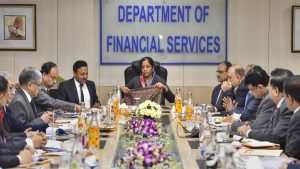 The Union Finance Minister has announced that the Merchant Discount Rate (MDR) charges for businesses with over Rs 50 crore annual revenues will be waived off from January 1, 2020. Also, the digital transactions made using RuPay credit cards, or UPI QR codes will not face any additional charges for merchants or customers from January 1, 2020. All shops, business establishments and companies with an annual turnover of Rs 50 crore or more have been mandated to offer these modes of payment to customers. The Department of Revenue will also notify RuPay and UPI as the prescribed mode of payment for digital transactions without any Merchant Discount Rate (MDR). The Merchant Discount Rate is the percentage of the digital transaction that a merchant pays to banks. This cost is often passed on to the customer. The decision aims to promote the home-grown digital payment pathways like RuPay and UPI, over those promoted by foreign companies, including VISA and MasterCard. The Union Finance Minister has announced that the Merchant Discount Rate (MDR) charges for businesses with over Rs 50 crore annual revenues will be waived off from January 1, 2020. Also, the digital transactions made using RuPay credit cards, or UPI QR codes will not face any additional charges for merchants or customers from January 1, 2020. All shops, business establishments and companies with an annual turnover of Rs 50 crore or more have been mandated to offer these modes of payment to customers. The Department of Revenue will also notify RuPay and UPI as the prescribed mode of payment for digital transactions without any Merchant Discount Rate (MDR). The Merchant Discount Rate is the percentage of the digital transaction that a merchant pays to banks. This cost is often passed on to the customer. The decision aims to promote the home-grown digital payment pathways like RuPay and UPI, over those promoted by foreign companies, including VISA and MasterCard. |
| Source: The Hindu |
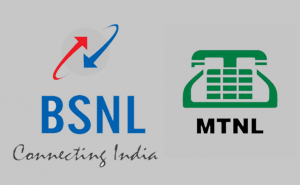 A Group of Ministers (GoM) has been constituted to to expedite revival plan of BSNL & MTNL. The GoM will fast-track and oversee the implementation of the Rs 69,000 crore revival plan for state-owned telecom corporations BSNL and MTNL. The GoM includes Defence Minister Rajnath Singh, IT and Telecom Minister Ravi Shankar Prasad, Home Minister Amit Shah, Finance Minister Nirmala Sitharaman, Commerce Minister Piyush Goyal and Oil Minister Dharmendra Pradhan. The government had approved a Rs 69,000 crore revival package for BSNL and MTNL which includes merger of the two loss-making firms, monetising their assets and giving VRS to employees. The GoM will expedite the smooth implementation of decisions taken on revival of BSNL and MTNL. A Group of Ministers (GoM) has been constituted to to expedite revival plan of BSNL & MTNL. The GoM will fast-track and oversee the implementation of the Rs 69,000 crore revival plan for state-owned telecom corporations BSNL and MTNL. The GoM includes Defence Minister Rajnath Singh, IT and Telecom Minister Ravi Shankar Prasad, Home Minister Amit Shah, Finance Minister Nirmala Sitharaman, Commerce Minister Piyush Goyal and Oil Minister Dharmendra Pradhan. The government had approved a Rs 69,000 crore revival package for BSNL and MTNL which includes merger of the two loss-making firms, monetising their assets and giving VRS to employees. The GoM will expedite the smooth implementation of decisions taken on revival of BSNL and MTNL. |
| Source: The Hindu |
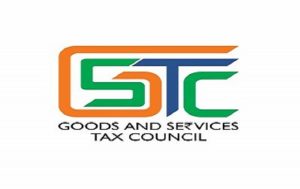 Central Board of Indirect Taxes and Customs (CBIC) has announced that it has paid Rs 1,12,000 crore as Integrated Goods and Services Tax (IGST) refunds to exporters. According to CBIC, over 83,000 exporters have been benefited by these refunds. The numbers indicated the government’s efforts to fast track refunds under GST especially to exporters. Also, as of now, refunds of only 3,604 crores are pending with Customs. CBIC is using data analytics to identify risky exporter entities that “take input tax credit fraudulently and monetize it by paying IGST and taking refund”. Such exporters are being subject to KYC and verification process before the grant of refund. Central Board of Indirect Taxes and Customs (CBIC) has announced that it has paid Rs 1,12,000 crore as Integrated Goods and Services Tax (IGST) refunds to exporters. According to CBIC, over 83,000 exporters have been benefited by these refunds. The numbers indicated the government’s efforts to fast track refunds under GST especially to exporters. Also, as of now, refunds of only 3,604 crores are pending with Customs. CBIC is using data analytics to identify risky exporter entities that “take input tax credit fraudulently and monetize it by paying IGST and taking refund”. Such exporters are being subject to KYC and verification process before the grant of refund. |
| Source: The News On AIR |
You need to login to perform this action.
You will be redirected in
3 sec
